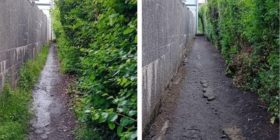Industrial action by headteachers impacts school monitoring in Monmouthshire

Industrial action by head teachers is impacting the ability to monitor performance and the effectiveness of teaching, a senior official has said.
Councillors in Monmouthshire were presented with a 79-page annual report from the authority’s chief officer for children and young people, which includes an overview of the county’s schools.
But Will McLean said the action short of a strike members of the National Association of Head Teachers have been staging since February has impacted how the county’s education service assess schools’ performance and the assurances he could give councilllors. The council was told to improve its monitoring by inspectors Estyn in 2020.
As part of the action head teachers have been refusing to undertake work, including responding to emails, taking phone calls or attending meetings, outside of their usual hours. They have also refused to hold staff appraisals, or facilitate unsolicited school visits or take part in additional work requested by councils or the regional education service.
Engagement with Estyn is also being kept to the legal minimum by the Wales-wide action.
Mr McLean told the full council: “That is posing a challenge for us. It’s not as easy to get into schools since the action started in February.”
But he said the department is always able to provide support when it is requested by schools, though his report said noted “a lack of engagement in progressing some policy positions”.
The industrial action has further impacted the reporting process as it no longer includes data on pupils’ exam performance of individual schools which the Welsh Government doesn’t want to be made available to the public.
Mr McLean said, while his previous reports included pages of data on pupils’ performance, and how that measured against expectation and other factors, he said that information is no longer considered as part of the report.
“The Welsh Government is moving away from that and now looking to do so by observation within schools such as learning walks and talking to learners and leaders in schools,” he said.
But he said that approach, which the Welsh Government had adopted before the pandemic and is continuing after the period where schools themselves had to award GCSE and A-level grades when exams couldn’t take place due to Covid and its lasting impact on education, has been hampered by the industrial action.
He added: “We have fantastic head teachers in Monmouthshire, but the industrial action is making that difficult.
“Because of the action short of a strike we are not able to provide the level of assurance we might have been able to in the past.”
But he said the council has seen a “definite improvement” in inspection reports produced by Estyn though he noted the council “still has two schools in a statutory category”.
Those are Dewstow Primary in Caldicot, which is in special measures, and Abergavenny’s King Henry VIII School, which is judged as ‘in need of significant improvement’.
Conservative opposition leader Richard John said he was concerned at the lack of exam results and achievement data.
He said: “I do think it makes is much more difficult for parents to make informed decisions (on) which school to send their children to and does make accountability more difficult.”
Mr McLean said its feared publishing exam results can lead to schools concentrating on only some students, but he said the department will be working with schools on how data on exam performance is presented.
The education service was inspected by Estyn, before the pandemic, and it is still working on its response which includes closing the attainment gap between what pupils who are entitled to free school meals achieve compared to pupils from better off families.
Mr McLean also said inflation, and difficulties in finding contractors presents a “real challenge” for schools in conditions which mean they require new buildings or upgradges while other pressures include recruitment and retention of staff and the funding that is available for schools.
Cllr Martyn Groucutt the Labour cabinet member for education, said the pandemic, financial collapse and cost-of-living crisis had to be recognised as well as a “challenging time in strictly educational terms” with a new curriculum for Wales being introduced and reform of the additional learning needs system.
He said: “As cabinet member I feel very confident we’ve got a grip on all these steps forward.”
By BBC LDRS
Spotted something? Got a story? Email News@News.Wales







